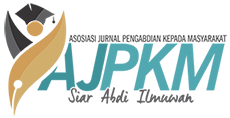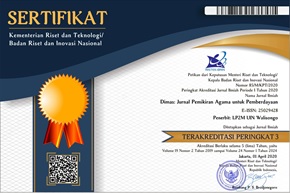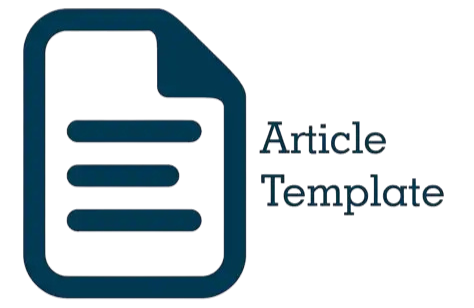Pemberdayaan Masyarakat Berbasis Komunitas Zakat Pada Masa Pandemi Di Desa Kahayya, Kabupaten Bulukumba
DOI:
https://doi.org/10.21580/dms.2021.212.9319Keywords:
Pemberdayaan, Komunitas, Zakat, PandemiAbstract
Zakat as one of the institutions in Islam, has a spiritual dimension and covers many aspects of community empowerment that include various aspects such as economic, social, health, education and religion, especially in the event of a pandemic. One of the community empowerment programs by zakat institutions is Zakat Community Development. One of the community empowerments programs by zakat institutions in this research to find out and analyze the concept of empowerment in the form of Zakat Community Development during the pandemic in Kahayya Village, Bulukumba Regency. The method in this study is qualitatively descriptive by finding detailed information related to the Zakat Community Development program in Kahayya Village, Bulukumba Regency. The results of this study show that several programs have been implemented covering various aspects such as socioeconomic, health, education and religion. In the field of health, disinfectant narrowing, vaccination programs, provision of handwashing, distribution of masks and hand sanitizers to socialization related to the prevention of the spread of the covid-19 virus to the community. Similarly, in the world of education, through ZCD is done the reactivation of reading parks and the development of ICT-based libraries. Socialization in pondok tahfidz as a preventive measure of transmission and healthy life is part of religious empowerment so that students can still learn religion. Especially in the economic aspects formed by several SME communities, namely farmers groups that develop AGROWISATA and horticulture, Kahayya coffee SMEs and honey mustika Kahayya SME groups.
Zakat sebagai salah satu pranata dalam Islam, memiliki dimensi spiritual serta mencakup banyak aspek pemberdayaan masyarakat yang meliputi berbagai aspek seperti ekonomi, sosial, kesehatan, pendidikan dan agama, khususnya pada saat terjadi pandemi. Salah satu program pemberdayaan masyarakat oleh lembaga zakat adalah Zakat Community Development. Tujuan penelitian ini untuk mengetahui serta menganalisis konsep pemberdayaan berupa Zakat Community Development pada masa pandemi di Desa Kahayya, Kabupaten Bulukumba. Metode pada penelitian ini adalah kualitatif deskriptif dengan menemukan informasi secara detail terkait program Zakat Community Development di Desa Kahayya, Kabupaten Bulukumba. Hasil penelitian ini menunjukkan bahwa telah dilaksanakan beberapa program yang meliputi berbagai aspek seperti sosial ekonomi, kesehatan, pendidikan maupun keagamaan. Pada bidang kesehatan dilakukan penyemprotan desinfektan, program vaksinasi, penyediaan tempat cuci tangan, pembagian masker dan hand sanitizer hingga sosialisasi terkait pencegahan penyebaran virus covid-19 kepada masyarakat. Demikian pula pada dunia pendidikan, melalui ZCD dilakukan pengaktifan kembali taman baca serta pengembangan perpustakaan berbasis TIK. Sosialisasi di Pondok Tahfidz sebagai langkah pencegahan penularan dan hidup sehat merupakan bagian dari pemberdayaan keagamaan agar santri tetap dapat belajar agama. Terkhusus pada aspek ekonomi yang terbentuk beberapa komunitas UKM yaitu kelompok tani yang mengembangkan AGROWISATA dan holtikultura, UKM Kopi Kahayya serta kelompok UKM Madu Mustika Kahayya.
Downloads
References
Al-Qardawi, Y. (1993). Al-Ibadah fi Al-Islam. Muassasah Risalah.
Al-Qardawi, Y. (2004). Fiqhuz Zakat terj. Hukum Zakat. Litera Antara Nusa.
Andriyani. (2019). Kajian Literatur pada Makanan dalam Perspektif Islam dan Kesehatan. Jurnal Kedokteran Dan Kesehatan, 15(2), 178–198.
Balkhair, A. A. (2020). COVID-19 Pandemic: A New Chapter in the History of Infectious Diseases. Editorial Oman Medical Journal, 35(2), 2–3. https://doi.org/10.5001/omj.2020.41
BAZNAS. (2020). Zakat Community Development. BAZNAS.
Galeotti, paolo surico and andrea. (2020). the economics of pandemic: the case of covid 19. business school.
Hamid, S. A. H. and M. L. (2020). Zakat and The Empowerment of The Hardcore Poor in The 21ST Century. Journal Critical Review, 7(5).
Kasri, R. A. (2017). Determinants of Poverty amongst Zakah Recipients in Indonesia: A Household Level Analysis. International Journal Of Islamic Economics and Finance Studies, 3(3).
Mafruhah, I., Istiqomah, N., Mulyani, N. S., & Ismoyowati, D. (n.d.). Implementasi Konsep Zakat Community Development ( ZPD ) dalam Rangka Pemberdayaan.
Mohamed Saladin Abdul Rasool, Mohamed Azmil Mohd Yusuf, and S. M. A. (2020). Wellbeing of The Society: A Maqashid Al-Syariah Approach. Afkar Special, 1.
Nor Azizan Che Embi, Salina Kassim, N. B. M. S. (2020). The Effect of Zakat Programs on The Social Impact of Microfinance Institution in Bangladesh. International Journal of Zakat and Islamic Filantropy (IJZIP), 2(1).
Nurzaman, M. S. (2017). Evaluation of the Produvtive Zakat Program of BAZNAS:A Case Study from Western Indonesia. International Journal of Zaka, 2(1).
Odeku, K. O. (2021). Socio-Economic Implications of Covid-19 Pandemic in South Africa. Academy Of Entrepreneurship Journal, 27(1), 2686.
Putri, D. A. S. (2019). Pengaruh Infrastruktur Kesehatan danPendidikan Terhadap Tingkat Kemiskinan di Indonesia. Universitas Airlangga.
Salma, N., Binti, S., Khairul, W., & Wan, A. (2019). The Awareness of Zakat in the Universal Society The Awareness of Zakat in the Universal Society. 9(11), 647–651. https://doi.org/10.6007/IJARBSS/v9-i11/6586
Downloads
Published
Issue
Section
License
Copyright
The copyright of the received article shall be assigned to the journal as the publisher of the journal. The intended copyright includes the right to publish the article in various forms (including reprints). The journal maintains the publishing rights to the published articles. Therefore, the author must submit a statement of the Copyright Transfer Agreement.*)
Licensing

This work is licensed under a Creative Commons Attribution-ShareAlike 4.0 International License.
In line with the license, authors are allowed to share and adapt the material. In addition, the material must be given appropriate credit, provided with a link to the license, and indicated if changes were made. If authors remix, transform or build upon the material, authors must distribute their contributions under the same license as the original.
_______
*) Authors whose articles are accepted for publication will receive confirmation via email and send a Copyright Transfer Agreement.









